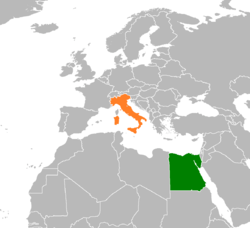Egypt–Italy relations
 |
|
Egypt |
Italy |
|---|---|
Egypt–Italy relations refer to relations between Egypt and Italy. Relations were first established during the period of the Roman Republic, when the Ptolemaic Kingdom frequently interacted with Rome, culminating in the Roman annexation of Egypt in 30 BC. With the dissolution of the Western Roman Empire in 476 AD and Egypt's continuation as a province of the Eastern Roman Empire until the Islamic conquest in 642 AD, there were no independent states of Italy and Egypt, and as such no diplomatic relations. Cultural ties between Egypt and Italy distanced further over time with the Islamisation of Egypt and the strength of Catholicism in Italy. It would not be until Egypt's official independence from the Ottomans in 1914 that relations with Italy would be reestablished. With the rise of Mussolini and fascism in Italy and the eventual Italian invasion of Egypt during World War II, relations became severely strained. However, after the war, relations were re-established and the countries now have a cordial relationship. Egypt has an embassy in both Rome and Milan, while Italy has an embassy in both Cairo and Alexandria. Egypt and Italy are both members of the Union for the Mediterranean.
Italy is Egypt's largest trade partner in the European Union, and is the third largest internationally following the United States and China. Furthermore, Italy's investments in Egypt are worth $2.6 billion, mostly concentrated in transport and banking services among other sectors, making it the fifth largest European investor in Egypt.[1] By the end of 2014, the volume of trade between the two countries reportedly reached $6 billion.[2]
In April 2016, diplomatic relations between the two countries were seriously strained when an Italian PhD student from the University of Cambridge was found brutally murdered in Cairo after he went missing in January of the same year. Subsequently, Italy withdrew its ambassador to Egypt for consultations in Rome regarding the criminal death of Giulio Regeni, who, at the time, conducted critical academic research on Egyptian labour rights and trade unions. Egyptian law enforcement then produced conflicting information on the fate of the Italian citizen, which was unacceptable to Italian investigators. As a result, the Italian press and foreign ministry pointed at the systematic human right violations in Egypt, and threatened with political sanctions unless police leadership and practices undergo significant revisions.[3]
See also
References
- ↑ Ayyad, Mohamed (8 December 2014). "50 Italian companies to hold investment talks in Egypt in February: Italian ambassador". Daily News Egypt. Retrieved 8 December 2014.
- ↑ Allam, Sanaa (10 March 2015). "Egypt-Italy Trade Hits US$6 Bln in 2014". Zawya. Retrieved 11 March 2015.
- ↑ Spalinger A (April 2016)."Ein Mordfall wird zur Staatsaffäre". Neue Zürcher Zeitung International. Retrieved May 5, 2016.
.svg.png)
